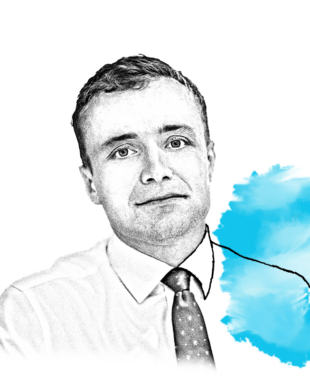Research trips are sometimes planned around a specific event or just as often to progress a particular project. Or, sometimes, a trip is planned with the objective to reassess a particular country; to challenge our working assumptions about the corporate landscape and to take the temperature on the management mood. In late May, Investment Analyst Michael Scott embarked on a three-week trip to France to do just that. Joined in the first week by Investment Manager, Fiona Macrae, in the second by Investment Manager, Lindsay Scott and in the third week by Investment Manager, Jamie Zegleman, the itinerary included over forty meetings travelling between Lyons, Grenoble, Paris and Clermont-Ferrand.
Think of France and you might think of wonderful bakeries, fine wine or haute couture. Maybe the illustrious grandes écoles or a history of industrial and scientific leadership comes to mind. Or you might think about industrial action and strikes. And, indeed, the first night of this trip to France was spent in a hotel at Schiphol airport in The Netherlands, rather than in Lyons as planned, courtesy of an air traffic controller dispute.
That was the last unfortunate encounter with industrial action
This meant that three of the meetings scheduled for that first day in Lyons had to be cancelled with Fiona and Michael eventually arriving in time to travel to Grenoble for the fourth planned meeting of the day. Thankfully, however, that was the last unfortunate encounter with industrial action and the itinerary for the rest of the trip went exactly to plan. The impressions gained over the three weeks mirrored that mixed experience.
France remains home to some of the world’s most innovative, strategically-sound and well-managed companies
Whilst we cannot dismiss the impact that strikes and social disquiet has had upon President Macron’s attempts to modernise the country’s working practices, and in particular, pensions, and should not underplay the impact on companies operating in the country, the inevitable noise around strikes and dissatisfaction does perhaps cloud the more striking reality that France remains home to some of the world’s most innovative, strategically-sound and well-managed companies.
The Itinerary
The trip itinerary included meetings with both owned and non-owned companies. There was a chance to meet with longstanding holdings, as well as their competitors. There was also the opportunity to meet with potential new investment ideas, and there were meetings with companies that don’t meet our investment criteria. Not only do those meetings often provide context and colour on industry trends, but they can also be an important reminder of what we don’t want to invest in, in turn underlining our conviction in the names held, and in our well-defined investment criteria.
Meetings where the team reached the rapid conclusion that no further work was warranted
Over the course of the team’s travels it is fair to say that the meetings spanned from the inspiring to the insipid, from the reassuring to those meetings where the team reached the rapid conclusion that no further work was warranted.
Industrial Leaders
There were meetings with some of the country’s best known industrial leaders, all with long histories and proud legacies, and some with exciting prospects too. Air Liquide’s Grenoble innovation centre was originally established to support the European space mission in 1962 and a discussion with the Head of Engineering at the centre was a particular highlight. He not only updated us on emerging technologies and operational plans but also reflected on the consistency of the company’s culture that has in turn continued to drive ambition and innovation over his 20-year career. A meeting with Michelin, another icon of France’s industrial heritage, was just as valuable. Visiting its offices, it is impossible to ignore the company’s many years of market leadership, but the focus of our conversation very much centred on how that track record of innovation is playing out today. The shift to electric vehicles will increase the demand for high specification tyres made by Michelin, with the weight of EVs, increased torque and regenerative breaking all increasing the need for performance and quality. Several OEMs have opted for Michelin as their tyre of choice and the company appears to be successfully positioning itself to make the most of this important trend.
Less exciting was a meeting with one of the country’s most iconic automotive companies. Its lineage might be just as impressive as Air Liquide and Michelin but, when looking to the future, the similarities end there. The company continues to lose market share and we left unconvinced by their pitch that a refresh of the product portfolio will reverse that decline. It also lags in EV innovation and here there is limited capacity to invest thanks to financial constraints. Instead, the company will likely have to rely on an uncertain and less financially attractive blend of external innovation and partnerships.
‘New’ Niches
But it wasn’t all industry titans and there were also encouraging meetings with companies that have established leading positions in niches underpinned by long-term trends. One of those, Edenred, provides outsourced employee benefits such as meal vouchers and childcare benefits through user-friendly and accessible digital platforms. As corporates strive to attract and retain staff, differentiated and broad benefits can play an important role and Edenred’s scale allows companies to provide a suite of benefits that only the very largest of companies could replicate in-house. Governments also play a, perhaps, underappreciated role in the outlook for the company as they deploy tax benefits to encourage domestic spending and to guide the spending habits of the population.
Software company Dassault Systèmes is also at the forefront of digital technologies. Spun out from the Dassault Groupe, itself another member of France’s business establishment and founded in 1929, our visit to the company’s campus south of Paris allowed us to see demonstrations of new facility management tools, supply chain management programmes and simulations of aerodynamics and airflow around a room. We learnt more about digital twins and the scope of their use. The Head of Strategy shared photographs of a successful operation on a baby’s heart with the surgeon using a digital twin of that heart provided by Dassault. We also heard about the creation of a digital twin of a cruise liner, which we were told is the largest digital twin in the world.
Learning From Meetings, Good and Not-So-Good
Of the meetings that might not be classified as a success in terms of investment potential, there were still takeaways. A meeting with a glass packaging manufacturing company left us with doubts around its prospects for growth, as well as greater awareness of the disruption risk facing the company. However, we did, usefully, hear their thoughts on the technologies that Air Liquide are delivering to this industry, allowing glass manufactures to reduce their emissions profile.
A Country Synonymous With Luxury
And, of course, there were meetings with some of France’s luxury leaders including Hermès International and Kering. The message from Hermès was reassuring, as expected, whilst the meeting with Kering served as a reminder that luxury isn’t as easy as the progress of Hermès and LVMH might suggest on a cursory glance. That said, as Kering works to address a number of self-inflicted issues, its longer-term outlook should be supported by a roster of strong brands with global appeal. In the meeting, the company re-iterated its dual track strategy with a focus on iconic, timeless products whilst maintaining the ‘newness’ that has made Gucci so successful.
A reminder that luxury isn’t as easy as the progress of Hermès and LVMH might suggest
Beyond these meetings in Paris we also took time to visit a number of luxury stores. These visits not only allow us to see the products in situ, but also the opportunity to observe consumer habits. In doing so, we might stay in a store for quite some time, so long that in one Hermès store, one of the members of our Research team was mistaken for a shop assistant, a case of mistaken identity that he took as a definite sartorial complement!
Outlook
France can be a difficult place to do business. There are certainly economic and social challenges. The inability of successive governments to bring change is an issue that can’t be ignored and won’t just disappear. The last time the Research team undertook an extended trip to France was back in 2013. During that trip there were meetings with senior representatives from the Banque de France as well as conversations with economic advisors to the then President Hollande. The message from those advisors was that the President was committed to serious reform and business-friendly change. The same would be said of President Macron today.
Back in 2013, during one journey across Paris the team found themselves in a taxi being pelted with eggs because that taxi driver had decided not to strike. This time it was action by air traffic controllers that impacted the trip. (And a dire shortage of taxis in Paris meant that this time, the team relied on a combination of the Métro, electric scooters and power walking!)
Longstanding industrial unrest and failure to implement change might not have direct and material financial impact on globally orientated companies in France that we favour but that environment does chip away at confidence and likely dents separate but associated efforts to make continued steps forward in the country’s approach to corporate governance.
The country’s legacy of technical innovation and craftsmanship remains intact
More positively, however, one of the clear conclusions of the trip was that the country’s legacy of technical innovation and craftsmanship remains intact. The roster of corporate leaders may have changed over the years but, equally, the consistency in that list is striking. It often seems to be the source of some national shame that the country has been unable to develop its own equivalent of the US FAANGs, but our three weeks there left us reassured that the country’s technical leadership and innovation remains very much in place. That success and growth might often be behind the scenes and finding it might take some digging, but that is what we believe we do best. If the success of a trip can be judged by both the level of reassurance and the amount of further work to be getting on with, this trip was certainly a success.
Stock Examples
The information provided in this article and the accompanying videos relating to stock examples should not be considered a recommendation to buy or sell any particular security. Any examples discussed are given in the context of the theme being explored.
Important Information
This article and the accompanying videos are provided for general information only and should not be construed as investment advice or a recommendation. This information does not represent and must not be construed as an offer or a solicitation of an offer to buy or sell securities, commodities and/or any other financial instruments or products. This article and the accompanying videos may not be used for the purpose of an offer or solicitation in any jurisdiction or in any circumstances in which such an offer or solicitation is unlawful or not authorised.


